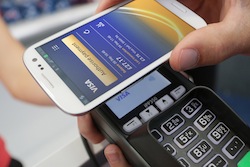NFC is being hampered by the need to install new infrastructure to use it, as well as Apple’s continued reluctance about the technology, Motorola Solutions has claimed.
The technology had been seen as the likeliest candidate for contactless m-payments. Operators such as Orange in France have been heavily promoting the technology although it has been slower to catch on in the UK, for example.
At the same time, NFC has mostly been featured on Android devices, with Apple, in particular, agnostic about the technology. The iPhone maker’s marketing chief Phil Schiller dismissed it as a solution in search of a problem last year.
Speaking at a press event on Thursday to unveil a new range of WLAN products, as well as security updates to its AirDefense portfolio, Motorola Solutions said manufacturers were starting to be unconvinced by NFC.
AirDefense works by detecting suspicious Bluetooth devices, which can then be used to find payment card skimmers in a retail store, for example. When asked why the portfolio did not scan for NFC, Gary Singh, WLAN product marketing manager at Motorola Solutions, said the company was not biased against NFC.
But he added: “Bluetooth Low Energy (BLE) is one of the next areas for us to invest in because it leverages existing infrastructure… phones have moved away from NFC, particularly the likes of Apple. We are not biased but our view is because BLE uses existing infrastructure, it will have a much more rapid adoption than NFC.”
Research commissioned by the Bluetooth Special Interest Group this week found penetration of Bluetooth technology in both feature and smartphones is predicted to rise from 90 percent today to 96 percent by 2018.
A separate report by Juniper Research suggested scepticism among the banking sector was another factor in holding back the implementation of NFC as a mainstream payment solution.
It said operators had had to do a lot of heavy lifting in promoting the technology although the recent emergence of host card emulation, where payment information is stored on the cloud rather than a physical secure element, could kickstart the market.



